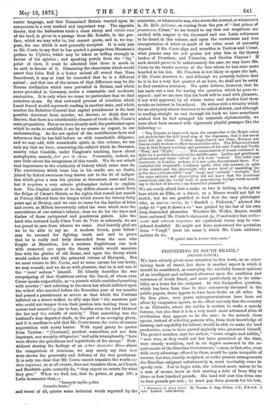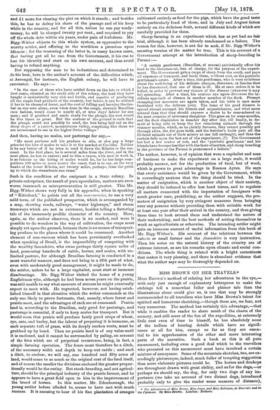PIONEERING IN SOUTH BRAZIL.* (SECOND NOTICE.] WE have already given
some attention to this work, as an enter- taining book of travel, but there is another aspect in which it should be considered, as conveying the carefully formed opinions of an intelligent and unbiassed observer upon the condition and resources of South Brazil, and more particularly as to its suita- bility as a home for the emigrant. In this Emigration question, which has been from time to time extensively discussed in the public papers, there appear to have been faults on all sides. In the first place, very grave misrepresentations have been set afloat by emigration agents, to the effect not only that the country is an Eldorado, where the settler is certain to make a speedy fortune, but also that it is in a very much more advanced state of civilisation than appears to be the ease; in the second, these agents, instead of selecting persons who, from their knowledge of farming and capability for labour, would be able to make the land productive, seem to have passed anybody who presented himself. The greater number, says the author, "town roughs and rabble," "men who, as they could not but have perceived at the time, were utterly worthless, and in no degree answered to the re- quirements of the Brazilian Government,"—men, in fact,who, even with every advantage offered to them, would be quite incapable of success, but who, heavily-weighted, as under present arrangements the Brazilian emigrant unfortunately is, must inevitably come to speedy ruin. For to begin with, the colonist must, unless he be a man of means, incur at first starting a debt of from fifty to three or four hundred pounds. His land will cost him from one to four pounds per acre ; he must pay three pounds for his hut,
and 11 more for clearing the plot on which it stands ; and besides this, he has to defray his share of the passage and of his keep while in the country, and for all this, unless he can pay ready- money, be will be charged twenty per cent., and required to pay off the whole debt within six years, under pain of-forfeiture. Mr. Bigg-Wither objects to this whole system, as oppressive to the worthy settler, and offering to the worthless a premium upon idleness ; for the reasoning of the latter is, in many known cases, that having got all he can from the Government, it his cue to lose his identity and start on his own account, and thus avoid having to refund anything.
But supposing the man to be industrious and determined to do his best, here is the author's account of the difficulties which, at Aesungai, for instance, the English colony, he will have to encounter. He says
:- "In the case of those who have settled down on the lots to which I first came, situated on the south side of the colony, the land they have bought is undoubtedly very rich and fertile, and capable of producing all the staple food products of the country, but before it can be utilised it has to be cleared of forest, and the cost of felling and burning the tim- ber on one sore alone, even when done in the rough, slovenly Brazilian roca fashion, would come to nearly £1, or nine days' labour for one man ; and if grubbed and made ready for the plough, the cost would be five times as great. But the contour of the ground is such that the plough could not possibly be used, the lots being laid out on the steep slopes of a narrow, mountainous valley, something like those we are accustomed to see in the higher Swiss valleys."
And then, having no mules, nor pasturage for any,— "He must perforce sell his produce in situ, or else pay a large price for the hire of mules to take it to the market at Cm itiba. Neither is he any better off if he tries to send it down the Ribeira to the sea- coast. In the first place, he is several miles from the river, and in the next place, he has no canoes ; and to him a canoe, with men to work it, is as ruinous as the hiring of mules would be, for be has large com- petitors 100 miles or more nearer the coast, that is to say, on the very banks of the lower Ribeira, not twenty miles, perhaps, from the point up to which the steamboats can come."
Such is the condition of the emigrant in a State colony. In private enterprises, the result of pure speculation, matters are even worse, inasmuch as misrepresentation is still greater. This Mr. Bigg-Wither shows very fully in his appendix, when in speaking of " Kittoland," he points out all the inaccuracies, to use a very mild term, of the published prospectus, which is accompanied by a map, showing roads, railways, "water highways," and steam tramways which are not in existence, besides telling a flattering tale of the immensely prolific character of the country. Here, again, as the author observes, there is no market, and were it possible to do wonders in the way of cultivation, the crops must simply rot upon the ground, because there is no means of transport- ing produce to the places where it could be consumed. Another element of non-success which has been persistently overlooked when speaking of Brazil, is the impossibility of competing with the wealthy fazendeiro, who owns perhaps thirty square miles of land, possessing hundreds of cattle, horses, and mules, with un- limited pasture, for although Brazilian farming is conducted in a most wasteful manner, and does not bring in a fifth part of what, even with moderately good management, it might be made to do, the settler, unless he be a large capitalist, must start at immense disadvantage. Mr. Bigg-Wither visited the home of a young Englishman who, although he had been seven years on the prairie, was still unable to say what measure of success he might eventually expect to meet with. He regretted, however, not having estab- lished himself in that situation which the writer commends as the only one likely to prove fortunate, that, namely, where forest and prairie meet, and the advantages of each are at command. Prairie land is, according to the Brazilian, only good for pasturage, and pasturage is essential, if only to keep mules for transport. But it would seem that prairie will produce fairly good crops of wheat, rye, oats, and barley, but the labour of preparing it is immense, as each separate tuft of grass, with its deeply sunken roots, must be grabbed up by hand. Then no prairie land is of any value until it is enclosed, and it cannot be surrounded by paling, on account of the fires which are of perpetual recurrence, being, in fact, a simple farming operation. The fence must therefore be a ditch, of the necessary width and depth to keep out cattle ; and such a ditch, to enclose, we will say, one hundred and fifty acres of land, would come to as much as the original cost of the land itself, and of course the smaller the divisions enclosed the greater propor- tionally would be the outlay. But stock-breeding, and not agricul- ture, should be the principal industry of the prairie farmer, and he appears to have a great field open to him in the improvement of the breed of horses. In this matter, Mr. Edenborough, the young settler before alluded to, seems to have met with much success. ft is amusing to hear of his fine plantation of oranges
cultivated entirely as food for the pigs, which have the good taste to be particularly fond of them, and in July and August fatten entirely on the delicious fruit, several different kinds of which are carefully provided for them.
Sheep-farming is an experiment which has as yet had no fair trial, although it has been already condemned as a failure. The reason for this, however, is not far to seek, if Mr. Bigg-Wither's amusing version of the matter be true. This is his account of a Government attempt at the introduction of sheep-breeding in Paranti :—
" A certain gentleman (Brazilian, of course) patriotically offers his land to the Government, free of charge, for the purpose of the experi- ment. The Government gets a cargo of sheep from the south, and pays all expenses of transport, and lands them, without coat, on the patriotic gentleman's estate. After a time, this gentleman, who is very solicitous about the well-being of his delicate charges, discovers, or fancies that he has discovered, that one of them is ill. He at once orders it to be killed, in order to prevent any chance of the disease (whatever it may be) spreading. After a time, his anxious eye again discovers the in- sidious approach of disease in another member of the flock. Prompt stamping-out measures are again taken, and his table is once more furnished with the delicate joint. The fame of his good dinners is spread abroad amongst his friends and acquaintances, and what more natural than that they should express a desire to be remembered on- the next occasion of necessary slaughter. This goes on for some months, and the flock diminishes in number day after day, till finally, in de- spair of being able to keep the few remaining animals through the summer months, which, as be plainly foresees, they cannot possibly get through alive, thefiat goes forth, and the butcher's knife puts all the ill-fated animals out of their misery at one fell onslaught, and thus the curtain falls upon the last act of the experiment. (?) The Government has lost a few contos of rein, and the 'patriotic gentleman' and his friends have become familiar with the taste of mutton, and sheep-breeding in the province of the Parana is pronounced a failure."
The author, however, is of opinion that were a capitalist and man of business to make the experiment on a large scale, it would probably answer, not for the production of food, but of wool, which is grown to great advantage in Buenos Ayres. He says that every assistance would be given by the Government, which is exceedingly anxious that the thing should be tried. In the matter of emigration, which is another object of their anxiety, they should be induced to offer less hard terms, and to regulate all matters connected with the importation of foreigners with much greater care, prohibiting, as the author suggests, the pro- moters of emigration by very stringent measures from bringing over any persons without providing them with suitable work for at least one year after their arrival in the country, and thus giving them time to look around them and understand the nature of their undertaking, and the best methods of setting themselves to- work as agriculturists or otherwise. The intending settler might gain an immense amount of useful information from this book of Mr. Bigg- Wither's. His account of the relations between the caboclo or small farmer and the fazendeiro is very instructive. Then his notes on the natural history of the country are of extreme interest, as are his remarks upon climate and social con- ditions. The whole thing is related with a bright earnestness that makes it very pleasing, and there is abundant evidence that what the author Bays may be thoroughly depended on.



































 Previous page
Previous page